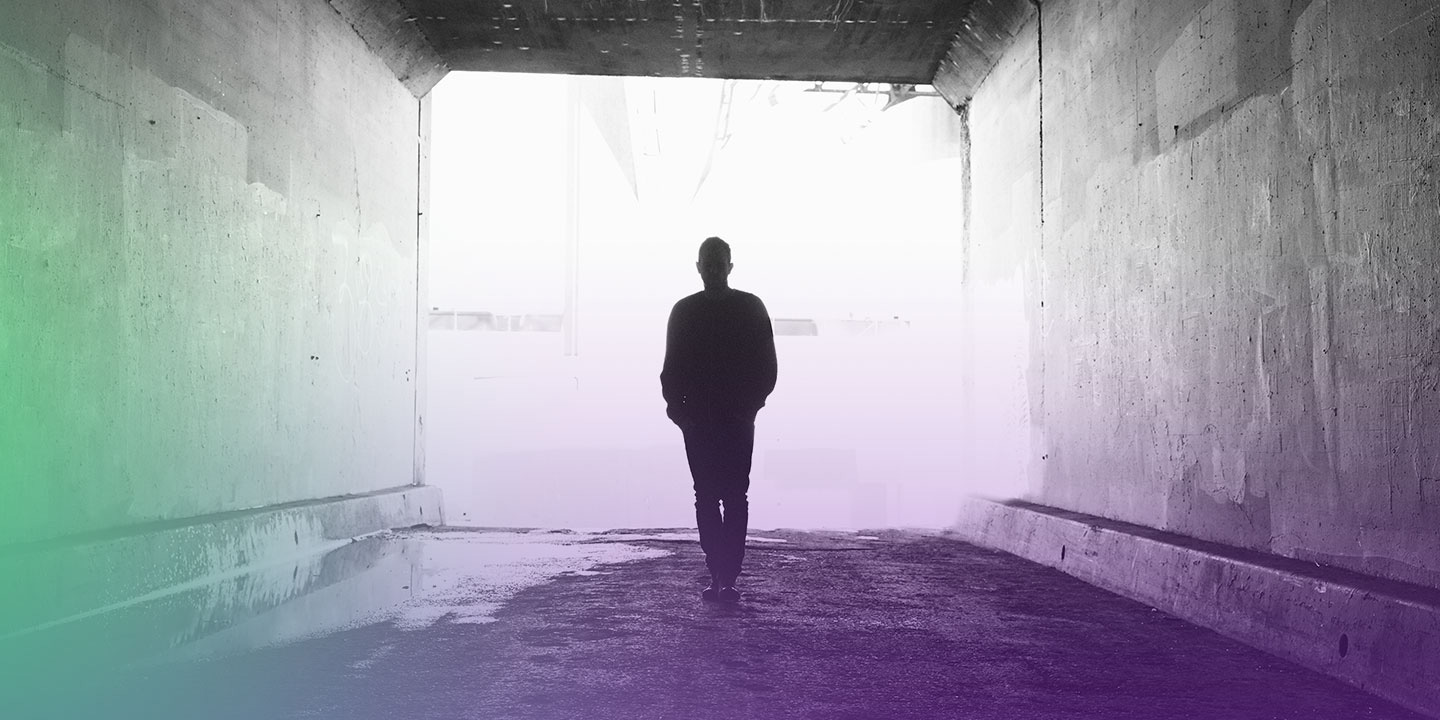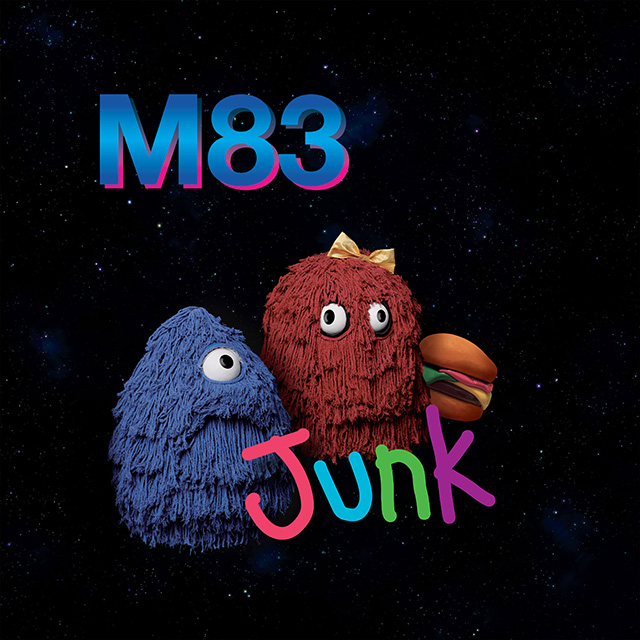

Anthony Gonzalez did not care for the new Star Wars movie.
“I really loved the first 15 minutes, but then it just started to look like a modern action film,” he says, his French accent worn with disappointment. His grievances are substantial. On returning heroes Harrison Ford and Carrie Fisher: "too old." On Darth Vader disciple Kylo Ren: “just ridiculous.” According to the 35-year-old mastermind behind M83, The Force Awakens relied too heavily on computer-generated tricks instead of the original trilogy's more tangible and soulful models and miniatures. It didn't live up to his childhood memories of the space saga; maybe it never had a chance.
“I feel like we're losing this culture of making things, everything is digital, even in music,” Gonzalez tells me, sounding twice his age. He often longingly dreams of what it would have been like if he had started his career in the 1970s or '80s: "There were so many new horizons then, so many ways to come up with a really strong and original identity. Nowadays, everything has already been done before. I truly believe that. It's impossible to come up with something new.”
He’s still doing what he can, though. Gonzalez has spent the last 15 years capturing his own nostalgia on record, trying to make it breathe and soar and thrill. After building a following across five studio albums, his own exuberant dreaminess struck a chord with the culture at large, producing a platinum single in "Midnight City." Its accompanying 2011 double album, Hurry Up, We’re Dreaming, made an artistic case for longform ambition in an era of bite-sized consumption. The record was also licensed within an inch of its life, its songs used to soundtrack everything from movie trailers and reality shows to commercials for Victoria's Secret and Costa Rica tourism. Gonzalez’s ability to make vintage sounds feel fresh while simultaneously indulging in the most unbridled nostalgia imaginable finally made him very successful on nearly every conceivable level. His wistful fantasies came to life. Then he had to come up with something new once again.

Gonzalez and his co-producer of the last half decade, veteran session and touring instrumentalist Justin Meldal-Johnsen, are sitting across from one another in a studio at Swing House Recordings, a massive, anonymous concrete building tucked into the residential L.A. neighborhood of Atwater Village. Gonzalez, who is deceptively unassuming until he gets going on a favorite topic, is on the couch; Meldal-Johnsen, whose wiry jolt of brown hair stands six inches above his scalp, giving him the air of a perpetually hassled mad scientist, leans forward in an office chair. One lumpy candle flickers meekly on a coffee table, which reveals stacks of Tape Op and vintage Playboy magazines underneath its glass surface. It’s not even 10 a.m., but purple mood lights illuminate soundproofed walls stacked halfway to the ceiling with amps and synthesizers plucked from the past 40 years. On a monitor off to one side of the mixing board, scenes from Fritz Lang’s classic dystopian film Metropolis play out on mute.
The duo, along with the help of a few carefully selected collaborators, have spent the last year and change in this den (and a few others) preparing M83’s seventh record in the only way Gonzalez believes a musician can in this era: “By looking behind and seeing what influenced us when we were kids and trying to make that our own.” But while Hurry Up was born out of the musician's move from France to L.A. and all the bright and ecstatic feelings that came with that six-thousand-mile relocation, at this point, the California shine has worn off.
Gonzalez parlayed his breakthrough to score a gig soundtracking the 2013 Tom Cruise modern action film Oblivion, though he has said the experience—making music to please everyone else before himself, being told his ideas were “too indie”—left him “on the verge of breaking down.” He had more autonomy working on his brother Yann’s art-house orgy You and the Night a year later, but an extended absence from his home country started to turn his attentions inward. After years of building the most extravagant, hyper-ambitious sonic landscapes he could think of, Gonzalez wanted to shift gears with the new M83 record, to crank down his epic visions into “something more crazy and fun—an organized mess.”
He’s calling it Junk.
He says the album title in such a deadpan that he's impelled to confirm its seriousness. (Not that he's really one for making jokes, anyway.) “It’s a statement,” he explains. “This is how people listen to music nowadays: They’re just gonna pick certain songs they like—one, two, if you’re lucky—and trash the rest. All else becomes junk.”
“We think about it in terms of all the space junk orbiting the planet,” Meldal-Johnsen adds.
At this point, Gonzalez can't help but blow-up the self-consciously small title, turning its meaning into an omen for the apocalypse. “I believe we’re gonna [destroy] ourselves very soon," he says with a shrug. "We’ll all have the same fate.” In other words: Once we all become space detritus, what's the difference between a masterpiece and some beautiful junk?
As the conversation progresses, the pair fall into a familiar rhythm. Meldal-Johnsen, an L.A. native, has become something of an all-around translator for his French friend since Gonzalez moved Stateside five years ago, an older brother type who showed him how to pay his American bills while continuing to keep his creative process on track—and his interviews on message. He elaborates on Gonzalez’s explanations, rephrasing when he senses the language barrier is getting in the way of a good quote. He describes his role in M83 as being “the finger on the pulse of logistics and the master plan.”
And if Gonzalez ever needed organizational help, Junk is the album for it. The record could still soundtrack a movie, of course—M83 wouldn’t be M83 without that neon nostalgia at its core, the romantic stuff that wholeheartedly believes pop music hit a peak with the "Punky Brewster" theme song—but it would probably look more like Robert Altman's disjointed Short Cuts than a more traditional rising narrative like, say, The NeverEnding Story.
The 15-track record is crammed full of eclectic ideas, from Moroder-esque dance numbers to elegant French chanson; while the artist's previous work dealt in broad, technicolor, expertly interwoven strokes, he spent more effort infusing individual moments with his trademark melancholy this time around. First single "Do It, Try It" feels like an invitation to randomness as it mixes house piano, video game squiggles, and plastic slap bass; the goofy “Moon Crystal” could double as the theme song for a feel-good '80s family sitcom; and the bulbous trifle “Bibi the Dog” locates the unlikely midpoint between Ariel Pink's prankster pop and Air's synthetic sophistication. The most sentimental cut is “For the Kids,” a straightforward ballad sung by Norway's Susanne Sundfør that wouldn't sound out of place on The Very Best of the Carpenters—the song aches to be pasted over a montage of a tween desperately looking for her lost dog. The record might be a grab bag, but there's still some baggage here.
“The last two years were up and down for me—a little bit of joy with the success of the last album, but a lot of pressure and a little bit of depression as well,” says Gonzalez. “You can feel more struggle in the music, in a way, some sadness that is not on Hurry Up.”
Junk has also served as a sort of corrective for its maker: Where too much outside input bred frustration with the Oblivion soundtrack, only Gonzalez and Meldal-Johnsen are at the helm; where life in a foreign country left him feeling estranged from his roots—especially considering the harrowing events that have unfolded near his loved ones while he’s been away—he recruited versatile French artist Mai Lan to sing on the album and incorporated more lyrics in his native tongue. And just for fun, Meldal-Johnsen—who has worked with just about everyone, from Garbage to Dixie Chicks to Blood Orange to Drake—dug into his extensive network to see if Beck and Guitar World staple Steve Vai could make cameos as well. Both said yes.
“It's almost like I can do whatever I want now,” Gonzalez says. “The success of [Hurry Up] really helped me to be more true to myself, and even if there's less of me on this album, it's probably my most personal record yet.” Junk is a risk he’s taking because he wants it for himself, though that doesn’t mean he's interested in being at the center of the world’s attention again. “I didn't really cope well with being the frontman all of a sudden,” he adds. “It gave me a lot of confidence, but [for Junk] I really wanted my voice to go away and for other people to carry the message for me.”
“I see what kids are watching nowadays, and it makes me sick. It's always about learning and being happy, but life is not about that. Life is way harder.”Anthony Gonzalez
Apart from Meldal-Johnsen, however, consistency in the way of collaborators has often been hard to come by for Gonzalez. M83 has never been a formal band, really; cofounder Nicolas Fromageau is long gone, having left in 2004; keyboardist Morgan Kibby, Gonzalez’s subsequent longtime co-writer and collaborator, parted ways with the act after touring Hurry Up to work on her own project, White Sea. (When reached for comment, Kibby was unavailable; a fan will replace her onstage for the Junk tour.) Talking about their finicky taste in creative co-conspirators, Gonzalez and Meldal-Johnsen explain that quality is simply hard to find, especially in an evermore homogenized industry town like Los Angeles.
“What's played in the mainstream is just awful, it makes me want to puke,” says Gonzalez, settling back into his old-man-yells-at-cloud mode. “Whereas what was playing in the ‘80s was actually really good, really thought-out music. Now, you're maybe going to hear 50 songs during the day that were made by 10 producers using the same sounds.”
Meldal-Johnsen concurs. “This could be construed as so holier-than-thou," he starts, "but I feel that enhancing expressions and giving them the most power that they can have is one of the greatest hopes for humanity. When music is ironic and throwaway, I resist it very much. So anyone that we involve in our sphere needs to feel that kind of energy within them too.”
“It's hard for us to work with anyone if we don't feel like they're involved emotionally,” Gonzalez concludes.
On Junk, French songwriter Mai Lan is the pair’s platonic ideal of a collaborator. When she met Gonzalez a year ago while visiting Los Angeles for an intensive songwriting camp, he heard some of her work and liked her immediately. “She can play so many different characters, like an actress,” he gushes, “but she always does them with a lot of sincerity.”
“For me, it was just awesome,” Mai Lan says brightly, via Skype, from her apartment in Paris, where she’s preparing to release her own album later this year. As she describes the experience, it’s clear she shares Gonzalez’s earnestness, if not his cynicism. “He was really happy, because I'm independent—I could take the instrumental and go on my computer and pick my favorite melodies, and he can choose which ones he likes best.”
Ultimately, she sang on four of the album's tracks—more than any other guest artist—including “Atlantique Sud,” a simple, piano-accompanied French duet with Gonzalez that’s perhaps the most unapologetically un-M83 song on the whole record. But for all of the album's left turns and quasi-deflections, it's still clearly coming from the brain of Anthony Gonzalez, a guy whose obsession with tapping into the pure emotion of his youth makes him all but unable to accept the realities of the present. “I see what kids are watching nowadays, and it makes me sick," he says at one point. "It's all 3D, there's no hand-drawn cartoons anymore. It's always about learning and being happy, but life is not about that. Life is way harder.”

Following the release of Hurry Up, which has sold 273,000 copies to date, Gonzalez moved from his modest apartment in Hollywood to a two-story house in the Echo Park hills. Upon entry, the place looks like a Better Homes and Gardens photoshoot: Everything is brilliant white with crisp wood accents, from the walls to the furniture, and intimidatingly clean (though Gonzalez says he’s not a neat freak). The heads of several small, taxidermied critters adorn one otherwise spotless wall. An open-plan, stainless-steel kitchen practically gleams, its refrigerator containing neat rows of various all-natural bottled beverages. Arranged on a faux-hearth in the living room, a collection of crystal decanters throws iridescent sunbeams across the spotless floors. Not that the house needs the extra light—its massive wraparound windows mean the place is engulfed in sunlight at all hours, with a view that overlooks the Silver Lake Reservoir. Once full and glittering, today the lake looks more like a rained-on construction site.
On the ground floor is Gonzalez’s small workspace: a self-designed, two-room, soundproofed, recording studio overflowing with synths, electric guitars, mixing boards, mics, and cables. On a ledge by the entryway sits an empty Nintendo 3DS case; he bought the handheld system to play recently rebooted versions of early Legend of Zelda games. As we walk through the door, it's clear that this is his favorite part of the house.
Back upstairs, the wooden dining table contains the only other signs of actual human inhabitance: Someone has left a Goonies comic book and several clumps of neon-colored baking clay out in the sunshine. After our long conversation at Swing House that morning, Gonzalez uses the comic as a placemat as he painstakingly rolls himself a spliff.
We relocate to deck seating out on the balcony. He seems almost viscerally relieved to be talking one-on-one, in his own home. Below, the backyard is overgrown or bare for the most part, except for a single, defining feature: an eight-foot-tall, Neverland-style canvas teepee set up in the middle, like a backyard tent. “For skunks and coyotes,” he says in that deadpan that makes it hard to tell if he’s kidding.
He talks about how he sometimes feels trapped by a lifelong compulsion to keep creating; even while recording an intentionally off-the-cuff record like Junk, he still found himself obsessing over every detail. It all makes him wish he had the guts to do something more important with his life, like “travel to Africa and help some kids.”
“I'm trying to put my work in perspective, to say it doesn't really matter,” he continues, lighting up. “But in the end, it always matters, even if you say, 'I'm not gonna care this time.' Because I care too much about it and what people are going to think.”
He pauses. “I'm not saying that it's destructing me—it doesn't stop me from being happy—but it's just another stress," he says. "In the end, I'm just doing this to leave a trace. Whatever trace it's gonna be, it's gonna be my trace.”
